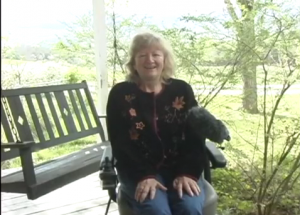Medical Cannabis helps ALS patient outlive her own doctors
Last month, Cathy Jordan sat on a panel at the Cannabis Therapeutics Conference in Arizona. Before taking the stage, she discussed the medical use of cannabis for ALS with Jahan Marcu, the Science Editor at Freedom is Green.
Cathy Jordan first noticed something was wrong in summer of 1985 when she couldn’t pick things up. Her muscles weren’t responding. In 1986, she was diagnosed with ALS (Amyotrophic Lateral Sclerosis). ALS, also known as Lou Gehrig’s disease, is characterized by the death of motor neurons leading to loss of limb control, breathing, swallowing, speech and widespread cellular dysfunction. Most cases of ALS are sporadic; it is not a viral or autoimmune disease.
“Most people start using a feeding tube because they are afraid of choking to death”, says Cathy.
In 1986, she was given 3 – 5 years to live according to her neurologi st. Nearly 3 decades later, she is still alive and living with ALS.
“All my docs are retiring or dead. I’ve outlived 5 support groups and 4 neurologists,” said Cathy. This actually posed a problem for Cathy who lost her social security benefits because she lived passed her expiration date. The state of Florida said her ID and regular documentation wasn’t good enough to prove she was alive and to continue to receive benefits. She had to ask her neurologist to fill out paperwork to prove she was still alive.
Mrs. Jordan began using Cannabis from a Florida grower to treat her ALS in the late 80’s. “Donny Clark provided my medicine, grown in the Myakka River Valley…he was busted and sentenced to life in prison, and that strain of Cannabis was lost.
“You know, they say the fountain of youth is in Florida. Maybe it was something in the soil that made this plant helps me…and I don’t understand why doctors wouldn’t study me. But I still would like to know why this is helping me.”
At first, doctors wouldn’t accept Cathy’s that marijuana could be responsible for her extended life span. Other doctors thought that smoking anything would impair her lung function and even threatened to have this paralyzed women committed, simply based on the fact that she thought Cannabis was actually helping her.
“I visited a neurologist at Duke University. When I told him that I was smoking Cannabis, he didn’t know what to do with me. He was afraid. He wouldn’t even take my blood pressure because I was using an illegal drug.”
Cathy adds:
“I asked my docs if they would take a drug if it was neuroprotective, an antioxidant and an anti-inflammatory. They say ‘yes’ and ask me if I know of one. Cannabis, I tell them.”
Nearly three decades later, the science has caught up with this miracle patient. Scientists created a mouse with ALS, which was very exciting for Cathy. Research has shown that THC and other cannabinoids can benefit mice with ALS. The mounting evidence of cannabinoids halting the progression of ALS has started to change the attitudes of doctors and prominent researchers have recently called for ALS clinical trials with Cannabis or cannabinoids.
“They all agree today that I should smoke Cannabis,” says Cathy. Twenty six years later, my original neurologist fought [successfully] to make sure Cannabis is legal for patients in Delaware.”
Researchers think Cannabis may help ALS patients relieving pain, spasticity, drooling, appetite loss and has minimal drug-drug interactions and toxicity.
“There are ALS patients associations that fight for the right of patients to die with dignity. But what about my right to life?” asks Cathy. “Keeping my medicine illegal removes my right to life.”
Video: Tucson AZ – The Use of Cannabis for ALS – Jahan Marcu & Cathy Jordan
Jahan Marcu is currently investigating the pharmacology of cannabinoid receptors. He was working at the California Pacific Medical Center Research Institute when exciting discoveries were made showing enhanced anti-cancer effects with THC and CBD from the Cannabis plant. The findings were published in the Journal of Molecular Cancer Therapeutics. In 2009 he received the Billy Martin Award from the International Cannabinoid Research Society (ICRS). Jahan is currently the vice-chair the Medical and Scientific Advisory Board at Americans for Safe Access (ASA). Questions? Contact [email protected]
DISCLAIMER: The views and opinions expressed are those of the author and do not necessarily represent any University, business or affiliates. While the information provided in this blog is from published scientific studies it is not intended to diagnose or treat any disease.
